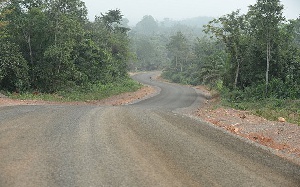- Home - News
- TWI News | TV
- Polls
- Year In Review
- News Archive
- Crime & Punishment
- Politics
- Regional
- Editorial
- Health
- Ghanaians Abroad
- Tabloid
- Africa
- Religion
- Election 2020
- Coronavirus
- News Videos | TV
- Photo Archives
- News Headlines
- Press Release
General News of Wednesday, 10 August 2016
Source: classfmonline.com
Cocoa road contracts risk termination
The Ghana Cocoa Board (COCOBOD) has issued a stern warning to contractors working on ‘cocoa roads’ in the country that they risk having their contracts abrogated if their pace of work continues to be unsatisfactory.
Chief Executive Officer of COCOBOD, Dr Stephen Opuni, said the institution would not hesitate to take action against the contractors if they failed to abide by the terms and conditions of their contracts.
Dr Opuni, who inspected work on the Obuasi-Ayanfuri road in the Ashanti Region on Tuesday August 9, expressed displeasure about delays in executing the project.
He said Ussua Ghana Limited, for example, which is working on the 15-km Obuasi-Kwame Prako road, has failed to expedite work on the project after several warnings from COCOBOD.
“This contract was signed in April, 2015 and we paid you advanced mobilisation to come to the site in May 2015. However, you delayed for three months before moving to the site. You are supposed to have done about 77 per cent of the project by now, but according to the regional engineer, you have done 48 per cent,” Dr Opuni said.
Dr Opuni said he will no longer entertain excuses for the delays. “I am told you are one of the best contractors in the country, and if I see where you have applied the bitumen, it is excellent, but the fact that you have delayed unduly” will not be entertained.
Dr Opuni explained that two warning letters have been issued to the contractors and hinted at “a third and final warning,” should the delays persist.
“If you do not make up for the 30 per cent deficit within the month, I will terminate the contract,” he warned.
Meanwhile, Roads and Highways Minister, Alhaji Inusah Fuseini, who was part of the inspection tour, said the exercise was important to ensure that the contractors delivered effectively and also on time.
He said the expectation of the people living in the beneficiary communities was to see the road done and “the purpose of this exercise is to keep contractors on their toes and let them understand that having awarded the contracts, we will not sit in Accra” and wait for reports, adding that the contractors needed to understand that when “we come and the language appears harsh, we are mirroring and reflecting the sentiments of the people”. “Please understand that it is very important, this is your country, and when you invest in the road network, you are investing in yourself.”
The Cocoa Roads Rehabilitation Project is aimed at developing roads in cocoa-growing areas to solve the challenges associated with carting cocoa beans from the farm gates to buying centres and also to improve the livelihoods of cocoa farmers.











